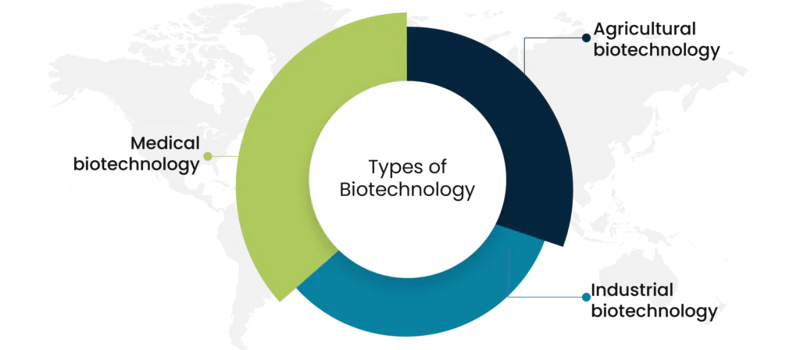Key takeaways
- Biotechnology is a diverse field of science that utilizes living organisms and biological systems to develop technological solutions for various industries, from healthcare to agriculture and beyond.
- The biotech industry encompasses a wide range of applications, including genetic engineering, vaccine development, and bioremediation, among others.
- Different sectors of biotechnology, denoted by colors, focus on specific areas of research and application, such as medical, agricultural, and industrial biotechnology.
- Applications of biotechnology include nutrient supplements, healthcare advancements, food processing innovations, and the development of biofuels, among others.
- Emerging trends in biotechnology include gene editing with CRISPR technology, synthetic biology and bioengineering, and personalized medicine, which promise to revolutionize various fields and industries.
What is biotechnology?
Biotechnology is a field of science that involves the use of living organisms, cells, and biological systems to develop technological advancements and applications that benefit various industries. These applications can range from healthcare and pharmaceuticals to agriculture, food production, environmental protection, and industrial manufacturing. Biotechnology encompasses a wide range of techniques and methodologies, including genetic engineering, molecular biology, fermentation processes, and bioinformatics, among others. Its primary aim is to harness the capabilities of living organisms to address challenges and create innovative solutions for diverse fields and industries.
Industry overview
The strides made in the biotech sector represent some of the most cutting-edge and refined accomplishments in contemporary science. Biotechnology harnesses living organisms and their biological systems to drive technological progress and tailor these innovations to meet the diverse needs of various fields, spanning from agricultural practices to medical applications. Recent years have seen the biotech industry garner numerous accolades for its breakthroughs and innovations, which have streamlined operations across multiple sectors.
Biotechnology encompasses a vast array of applications, including genetic engineering, vaccine development, bioremediation, and the manipulation of living organisms. It branches into different sectors denoted by colors, such as red, green, white, yellow, blue, grey, gold, brown, purple, orange, and black biotechnology, each focusing on distinct areas of research and application. From deciphering the human genome to producing laboratory-grown foods and preserving crop diversity, biotechnology plays a pivotal role in shaping ecosystems and advancing scientific understanding.
Types of biotechnology

Medical biotechnology
This is one of the most common types of biotechnology. It involves the use of living cells and other cell materials for the purpose of improving the standards of healthcare. Essentially, it is used for discovering cures as well as eradicating and preventing diseases. This branch of the different types of biotechnology is concerned with producing pharmaceutical drugs or vaccines as well as other chemicals to combat diseases.
Agricultural biotechnology
Agricultural biotechnology is a recent development among the different types of biotechnology. The applications of biotechnology in agriculture have yielded remarkable results. It primarily focuses on developing genetically modified plants for the purpose of increasing crop yields. They also help in introducing specific characteristics to the plants that provide them with an advantage when growing in regions that place some kind of stress factor on the plant, such as weather and pests.
Industrial biotechnology
In industrial biotechnology, biological resources are used to produce materials, energy, and chemicals that are required for the development of industrial goods. They also engage in producing bio-based products like paper, pulp, textiles, biofuels, and biogas. It plays a vital role in improving the performance of the industry and adds value to its products too. Notably, they are also known to provide several other benefits such as pollution prevention, resource conservation, and cost reduction. Industrial biotechnology is also used to manufacture items such as beer and wine, washing soaps and detergents, and several other personal care products.
Applications of biotechnology

The applications of biotechnology in various industries are reducing the excessive dependence on fossil fuels and are helping in the development of better and more environment-friendly products. Here are some of the key sectors that are greatly benefiting from the discoveries in the biotech industry:
Nutrient supplements
One of the most iconic inventions in the biotech industry is the infusion of nutrients into food. It provides food with heavy nutrients that are necessary for such situations. It provides food with heavy nutrients that are necessary, especially in situations where people are ill or undernourished.
Healthcare
Healthcare is one of the sectors that has benefited the most from the developments in the biotech industry. Biotechnology is used in the healthcare industry for diagnosis and treatment of different diseases. They are also used in the development of vaccines that help prevent deadly diseases.
Food processing
Food materials are characterized by their tendency to perish easily and have shorter shelf-lives. However, recent innovations in the biotech industry help in converting non-palatable and easily perishable products to edible and portable foods and beverages that have a longer shelf life. Biotechnology also helps in improving the edibility, texture, and storage of the food materials.
Biofuels
The biotech industry is increasingly engaged in the discovery of alternative sources of energy. The dwindling oil resources in the world and their related environmental impacts are some of the major factors fueling this research. One of the key examples of success in this area is the use of corn to produce combustible fuel for running car engines. These fuels do not produce the greenhouse gases and harm the environment.
Emerging Trends in Biotechnology
Gene Editing and CRISPR Technology:
Gene editing techniques, particularly the Clustered Regularly Interspaced Short Palindromic Repeats (CRISPR) system, have revolutionized the field of biotechnology. CRISPR-Cas9 and related technologies allow for precise and targeted modification of DNA in various organisms, including humans. This has significant implications in areas like genetic therapies, where it can be used to correct genetic disorders, and in agriculture, where it can enable the development of crop varieties with improved traits, increased yields, and resistance to environmental stressors.
Synthetic Biology and Bioengineering:
Synthetic biology is an interdisciplinary field that involves the design and construction of biological components, devices, and systems for various applications. This trend encompasses the development of engineered microorganisms, biological circuits, and biosensors for purposes such as biofuel production, pharmaceutical manufacturing, and environmental monitoring. As technology advances, we are witnessing the creation of entirely novel organisms and metabolic pathways that can perform valuable functions, which has the potential to disrupt traditional industries and open up new possibilities in biomanufacturing and biocomputing.
Personalized Medicine and Precision Biotechnology:
Personalized medicine is an emerging trend that tailors medical treatments and interventions to an individual’s genetic, genomic, and clinical characteristics. Biotechnology plays a crucial role in this field by enabling the analysis of an individual’s unique genetic makeup and health data to develop targeted therapies and treatment plans. From cancer treatments to rare disease therapies, personalized medicine is becoming increasingly common and effective.
Conclusion
In conclusion, the advancements in biotechnology have not only revolutionized various industries but also raised important ethical considerations. From healthcare and agriculture to food production and environmental protection, biotechnologies have had a profound impact on our health, environment, and overall well-being. By harnessing the power of living organisms and biological systems, biotechnology has facilitated the development of pharmaceuticals, vaccines, and personalized medical treatments, improving medical diagnosis and enabling the production of nutritious, toxin-free, and allergen-free food. However, as we embrace the potential of biotechnology to address challenges such as insect resistance, crop diversity, and biofuel production, it’s crucial to consider biosafety, biodiversity, and the potential misuse of biotechnologies for biological warfare or bioterrorism. Moreover, the widespread use of pesticides, chemicals, and genetically modified organisms raises questions about their long-term effects on human health and the environment. Moving forward, it’s imperative to continue exploring the applications of biotechnology in sustainable agriculture, marine resources utilization, and defense mechanisms against diseases and environmental threats. By prioritizing ethical considerations, promoting biodiversity conservation, and ensuring biosafety measures, we can harness the full potential of biotechnologies to create a healthier, more resilient, and environmentally sustainable future.
Know more about the market intelligence solutions that we offer for the biotech industry






